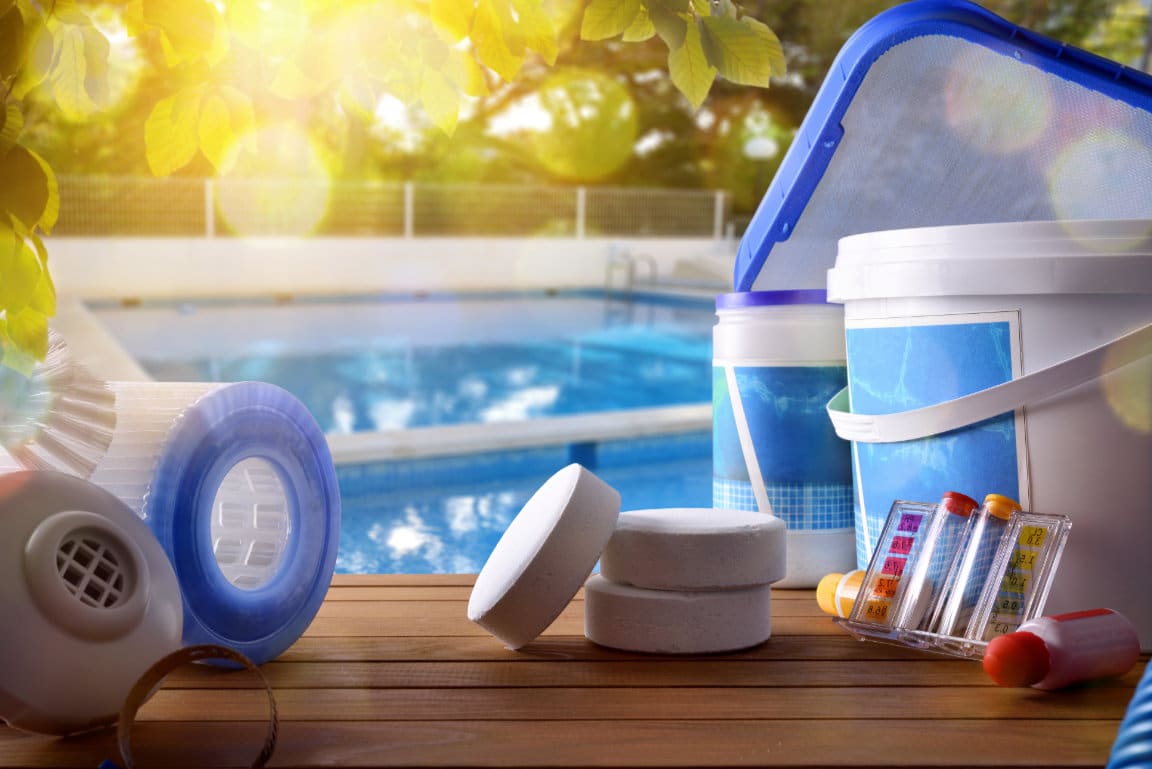All pools, spas, and hot tubs require sanitization and maintenance. Whatever your choice this is essential to the health of your pool, and it eliminates stress on pumps, filters and robotic cleaners.
Chlorine
The most common way to disinfect is to chlorinate your pool. Traditional chlorine options include:
Tablets
Discs of chlorine are placed in the skimmer basket, or a floating dispenser and they dissolve over time.
Granular Chlorine
This powdered product is poured directly into your pool and the amount is regulated by pool chemistry tests.
Liquid Chlorine
This is a fast-acting solution however it has a short shelf life. That is not the case for tablets or granular chlorine.
The advantages of traditional chlorine are:
- It kills pathogens and algae
- Works on both indoor and outdoor pools
- Destroys contaminants
The Disadvantages Are:
- It can etch concrete pools requiring replastering
- Can cause eye or skin irritation
- Odor permeates clothing
Bromine
Bromine is another sanitization option, which disinfects the water similar to chlorine. The main difference is that bromine is milder and not as likely to cause skin and eye irritation. It is also an excellent choice for hotter areas of the country because it is more stable and will last longer than chlorine. Bromine is a good choice for indoor pools using tablets comprised of 2/3 Bromine and 1/3 Chlorine.
The advantages of using bromine for your pool are:
- Effective as a disinfectant and algicide
- No strong odors
- Especially effective for spas and hot tubs
The disadvantages of bromine are:
- Does not work effectively when exposed to sunlight
- More expensive than chlorine
- Less oxidation power than chlorine
Pool Oxidizer
Ozone generators work as an efficient oxidizing agent and keep bacteria and pathogens in check. Ozone is one hundred times more powerful than chlorine, but it is not as effective a sanitizer by itself. Ozone is not meant to replace chlorine but to minimize the amount your pool requires.
Pool Ionization
Ionization is another option. Ionizers are hard wired devices that produce copper and silver ions. These ions are charged to attract bacteria, germs and algae and send them to the filtration system.
The advantages of ionization are:
- Inexpensive to maintain
- Reduces the need for chemicals
- Will not harm pool equipment
The disadvantages are:
- Some chlorine is still required
- To work effectively the pump must operate 24/7
- Water pH must be at specific levels, or the copper ions will cause staining
Saltwater Chlorination
Salt generators are commonly built into pool systems today. These generators produce chlorine by electrolysis or said another way, the salt attaches itself to electrical plates. As the salt breaks down chloride molecules are released into the water. Another advantage is that normal chlorine often causes chemical levels to spike where salt generators deliver continuous balanced chlorine, and this generally eliminates skin and eye irritation. The only negative side of this chlorination process is if the saline concentration is not kept to low levels, it can cause premature corrosion of metal components in a pool system.
While any of these solutions will help manage a healthy pool, they all will require some chlorine. Sanitizing your pool, spa, or hot tub makes it safe for swimming. It kills pathogens, algae, and bacteria and allows you to use traditional chlorine in a safe and low-impact way.





